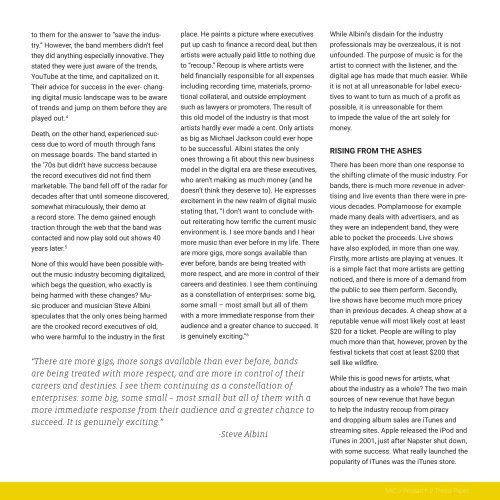Create successful ePaper yourself
Turn your PDF publications into a flip-book with our unique Google optimized e-Paper software.
to them for the answer to “save the industry.”<br />
However, the band members didn’t feel<br />
they did anything especially innovative. They<br />
stated they were just aware of the trends,<br />
YouTube at the time, and capitalized on it.<br />
Their advice for success in the ever- changing<br />
digital music landscape was to be aware<br />
of trends and jump on them before they are<br />
played out. 4<br />
Death, on the other hand, experienced success<br />
due to word of mouth through fans<br />
on message boards. The band started in<br />
the ‘70s but didn’t have success because<br />
the record executives did not find them<br />
marketable. The band fell off of the radar for<br />
decades after that until someone discovered,<br />
somewhat miraculously, their demo at<br />
a record store. The demo gained enough<br />
traction through the web that the band was<br />
contacted and now play sold out shows 40<br />
years later. 5<br />
None of this would have been possible without<br />
the music industry becoming digitalized,<br />
which begs the question, who exactly is<br />
being harmed with these changes? Music<br />
producer and musician Steve Albini<br />
speculates that the only ones being harmed<br />
are the crooked record executives of old,<br />
who were harmful to the industry in the first<br />
place. He paints a picture where executives<br />
put up cash to finance a record deal, but then<br />
artists were actually paid little to nothing due<br />
to “recoup.” Recoup is where artists were<br />
held financially responsible for all expenses<br />
including recording time, materials, promotional<br />
collateral, and outside employment<br />
such as lawyers or promoters. The result of<br />
this old model of the industry is that most<br />
artists hardly ever made a cent. Only artists<br />
as big as Michael Jackson could ever hope<br />
to be successful. Albini states the only<br />
ones throwing a fit about this new business<br />
model in the digital era are these executives,<br />
who aren’t making as much money (and he<br />
doesn’t think they deserve to). He expresses<br />
excitement in the new realm of digital music<br />
stating that, “I don’t want to conclude without<br />
reiterating how terrific the current music<br />
environment is. I see more bands and I hear<br />
more music than ever before in my life. There<br />
are more gigs, more songs available than<br />
ever before, bands are being treated with<br />
more respect, and are more in control of their<br />
careers and destinies. I see them continuing<br />
as a constellation of enterprises: some big,<br />
some small – most small but all of them<br />
with a more immediate response from their<br />
audience and a greater chance to succeed. It<br />
is genuinely exciting.” 6<br />
“There are more gigs, more songs available than ever before, bands<br />
are being treated with more respect, and are more in control of their<br />
careers and destinies. I see them continuing as a constellation of<br />
enterprises: some big, some small – most small but all of them with a<br />
more immediate response from their audience and a greater chance to<br />
succeed. It is genuinely exciting.”<br />
-Steve Albini<br />
While Albini’s disdain for the industry<br />
professionals may be overzealous, it is not<br />
unfounded. The purpose of music is for the<br />
artist to connect with the listener, and the<br />
digital age has made that much easier. While<br />
it is not at all unreasonable for label executives<br />
to want to turn as much of a profit as<br />
possible, it is unreasonable for them<br />
to impede the value of the art solely for<br />
money.<br />
RISING FROM THE ASHES<br />
There has been more than one response to<br />
the shifting climate of the music industry. For<br />
bands, there is much more revenue in advertising<br />
and live events than there were in previous<br />
decades. Pomplamoose for example<br />
made many deals with advertisers, and as<br />
they were an independent band, they were<br />
able to pocket the proceeds. Live shows<br />
have also exploded, in more than one way.<br />
Firstly, more artists are playing at venues. It<br />
is a simple fact that more artists are getting<br />
noticed, and there is more of a demand from<br />
the public to see them perform. Secondly,<br />
live shows have become much more pricey<br />
than in previous decades. A cheap show at a<br />
reputable venue will most likely cost at least<br />
$20 for a ticket. People are willing to play<br />
much more than that, however, proven by the<br />
festival tickets that cost at least $200 that<br />
sell like wildfire.<br />
While this is good news for artists, what<br />
about the industry as a whole? The two main<br />
sources of new revenue that have begun<br />
to help the industry recoup from piracy<br />
and dropping album sales are iTunes and<br />
streaming sites. Apple released the iPod and<br />
iTunes in 2001, just after Napster shut down,<br />
with some success. What really launched the<br />
popularity of iTunes was the iTunes store.<br />
<strong>MIC</strong> // Research // Thesis Paper





